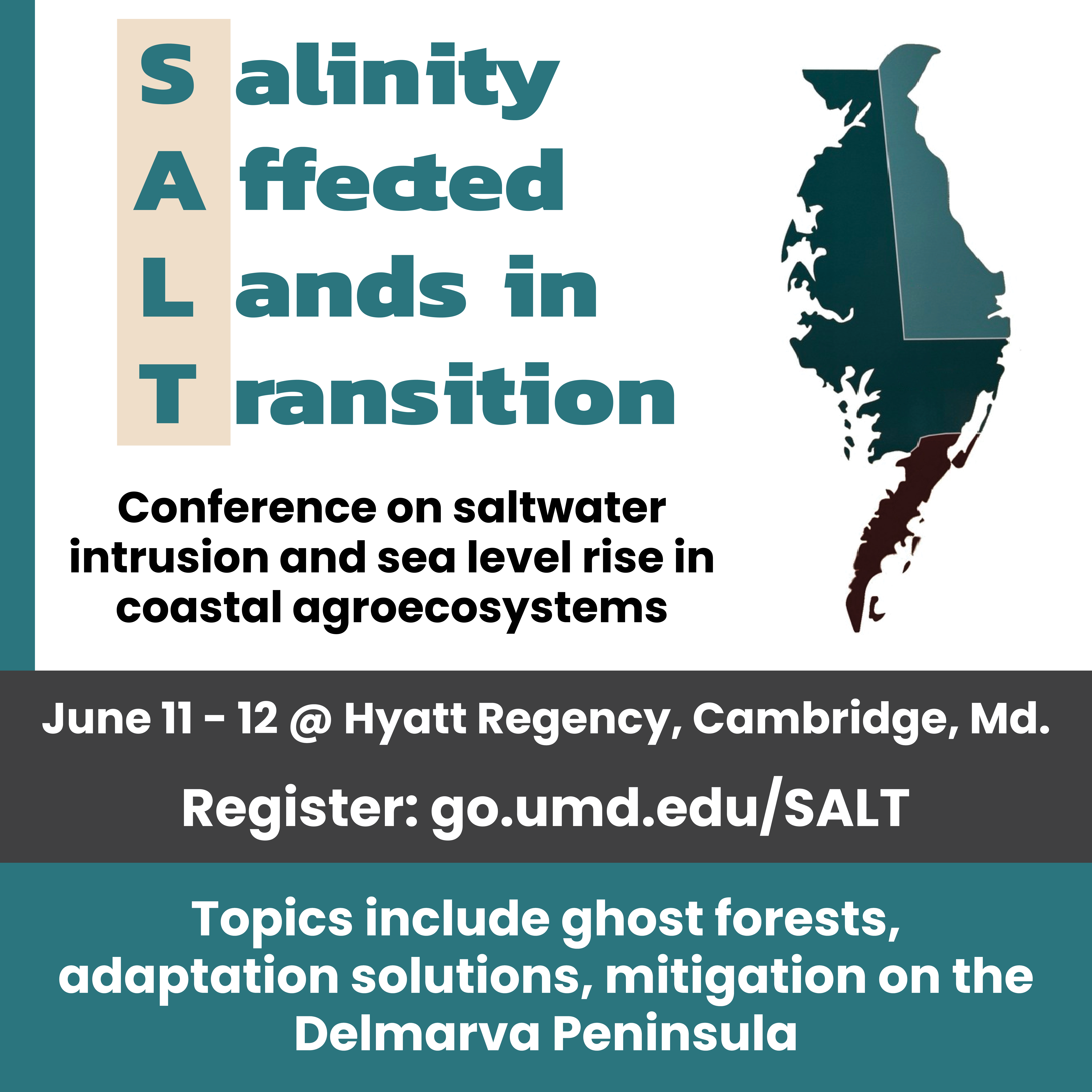Salinity-Affected Lands in Transition (SALT) Conference
- Hyatt Regency Chesapeake Bay
- All Day
Saltwater intrusion represents one of the foremost challenges related to climate change facing farmers in coastal communities in the Mid-Atlantic region. SALT, a two-day conference focused on saltwater intrusion and sea level rise in coastal agroecosystems, will be held June 11 and 12, 2024, at the Hyatt Regency in Cambridge, Md., and hopes to address what is happening in academics and on the ground to face it.
SALT stands for “Salinity-Affected Lands in Transition.” The conference will feature expert speakers discussing saltwater intrusion and sea level rise, case studies of areas across the country and hemisphere, environmental justice, coastal farming, ghost forests, adaptation solutions and mitigation strategies.
“The SALT Conference will bring together practitioners, policy-makers, and scientists to discuss issues related to sea-level rise and saltwater intrusion across the Eastern Seaboard of the U.S. I am excited to share some of our lessons learned from projects in Maryland, Delaware, and Virginia (funded by USDA-NIFA, NFWF, and the NSF) and learn from others who are facing similar challenges across the U.S. and the world,” said Dr. Kate Tully, a University of Maryland College of Agriculture and Natural Resources researcher investigating saltwater intrusion on the Delmarva Peninsula. “The SALT conference will provide a platform for information sharing, partnership building, and networking. I'm hoping for a great turnout.”
This conference highlights research being conducted by the University of Maryland (UMD) Agroecology Lab, the University of Delaware (UD) and George Washington University (GWU) on the Delmarva Peninsula, which comprises the coastal areas of Maryland, Delaware and Virginia. The partners have been researching the extent and economic impact of saltwater intrusion in the region and developing potential mitigation strategies for land affected by saltwater intrusion. The Harry R. Hughes Center for Agro-Ecology has been partnering with researchers from these institutions on outreach and stakeholder engagement for the project.
This research and conference are supported by grants from the National Fish & Wildlife Foundation, the U.S. Department of Agriculture National Institute of Food and Agriculture, and the National Science Foundation. People can register for the conference online at go.umd.edu/SALT. Registration is open until June 3, 2024.
This conference is complemented by a podcast series called Delmarva’s Invisible Flood. The three-episode series features conversations with the researchers at UMD, UD and GWU who are working on the ground to test and implement mitigation strategies, map saltwater intrusion’s extent, and deduce its impact on society. The podcast series can be found at hughescenter.podbean.com.
Location
Department/Program
- Academics
- Agricultural and Resources Economics (AREC)
- Agriculture
- Diversity, Equity, Inclusion and Respect (DEIR)
- Entomology (ENTM)
- Environment & Natural Resources
- Environmental Science and Policy (ENSP)
- Environmental Science and Technology (ENST)
- Extension
- Institute of Applied Agriculture (IAA)
- Landscape Architecture (LARCH)
- Nutrition and Food Science (NFSC)
- Plant Science and Landscape Architecture (PSLA)
- Research
